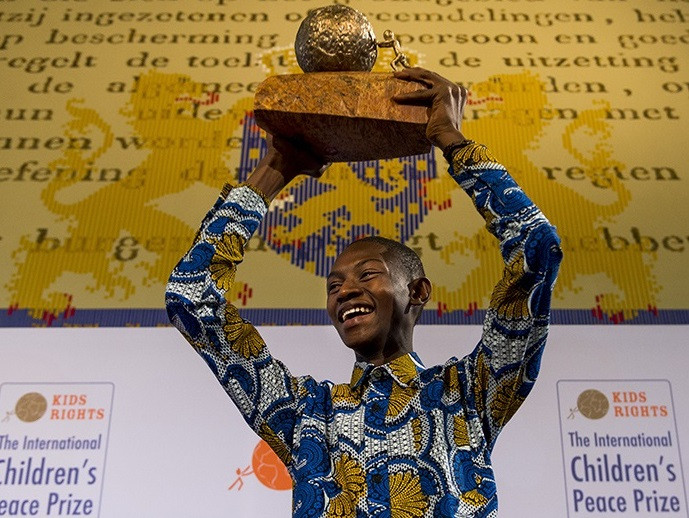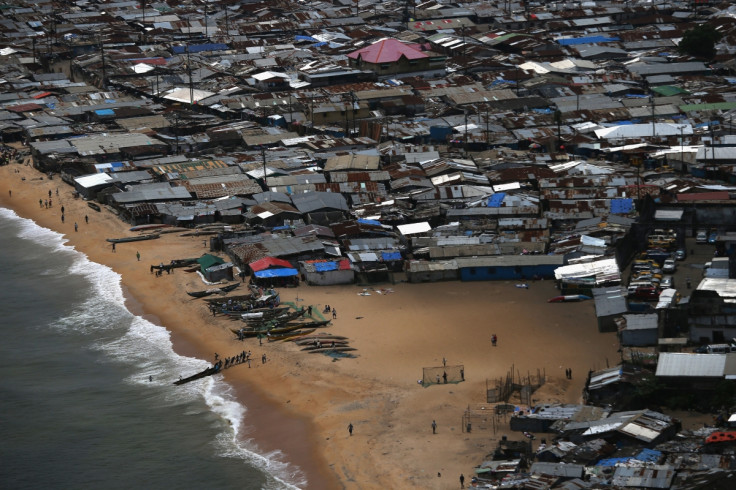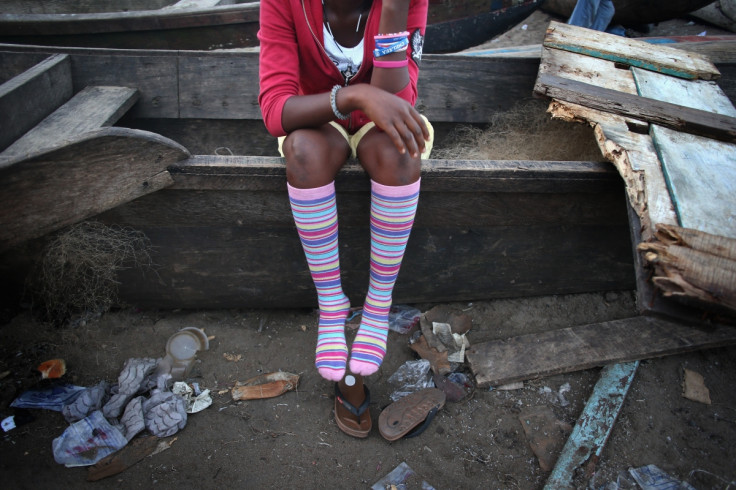Teenage activist Abraham Keita: 'I am a victim of the bloody civil war in Liberia'

Abraham Keita was born in West Point, the largest slum of the Liberian capital Monrovia, in 1998. When he was a year old, civil war broke out for the second time in a decade. Between 1989 and 2003, a quarter of a million people are estimated to have been killed during the two conflicts, with thousands displaced and child soldiers recruited at an unprecedented rate by guerilla leader Charles Taylor.
Life for Keita in this environment was unimaginably hard. When he was five, his father was killed while working as a driver for a humanitarian organisation, leaving Keita and his mother to fight for survival in the slums where poverty, disease and sexual violence are still endemic. Now aged 17, Keita has just been awarded this year's International Children's Peace Prize for his work to reduce child violence and his fight to bring perpetrators to justice.
One incident sparked Keita's passion for child rights. In 2007, when he was nine, 13-year-old Angel Togba was raped and strangled to death in a horrific attack allegedly carried out by her foster parents.
"I did not know her, but I felt she could have been one of my sisters. It could have been me," Keita says. "It made me realise I need to speak up for children, especially girls, whose rights should be promoted and respected so nobody can take advantage of them." To this day, no one has been held accountable for the girl's murder.
Since then, Keita has led demonstrations, lobbied the Liberian government and spoken tirelessly about child violence. His efforts paid off in 2012, when Liberia became one of the first African countries to adopt comprehensive legislation for children. Keita, himself still a child, lives in West Point with his mother.
"Growing up in Liberia as a child is like you are growing up as an adult, especially in where I am from," he says. "It is like growing up in the smoke of a huge fire, because life is so difficult, hard and frustrating. I live in a community where poverty is spelled out on the faces of people.
"I am a victim of the bloody civil war in Liberia. Growing up, I saw children raped, abused, harassed and intimidated, but we are human beings and our rights should be respected too."

Liberia, Africa's oldest republic, is one of the poorest countries in the world and the consequences of the wars that ravaged the economy are still very visible. Around 80% of the population lives below the poverty line and much of the country lacks electricity and running water. Disease and illiteracy is rife. Sexual and physical abuse against children is widespread.
More than 70,000 people live in West Point, one of the most densely-populated areas of Monrovia. The residents only have access to four public toilets, but many cannot afford to use them, according to UN research carried out in 2009. "People openly urinate and defecate in the street, so children are forced to live in this situation. There is so much disease," Keita says. "It is an area where your closest neighbours are not people, they are cockroaches and mosquitos. Human beings shouldn't live like this."
Sexual violence
Over 10 years have passed since conflict ended in Liberia, but in the years of shaky peace that have followed, girls and boys are still exceptionally vulnerable to abuse. Almost half of all adolescents in the country are affected by sexual violence by the age of 15 and rape is the most commonly reported crime in the country, although report rates are dismally low because of the fear of being shamed by families and communities.
Last year, Keita launched an anti-rape campaign to draw attention to the problem, distributing posters, talking to children and young people and speaking on the radio. He hopes the campaign will help children better protect themselves from predators, while encouraging victims to come forward.
"I launched the campaign to bring together children to stand up for themselves, especially girls," he says. "We have been able to sensitise girls to the problem and help protect them from abuse and exploitation, by telling them they should not go to places alone where they could be raped and warning them about getting transport alone."
He says tricks are commonly used by adults to entice children, including tempting them with biscuits. "Children as young as four are raped," Keita says, adding he hopes to make his campaign international. "We know the problem of rape is severe in India, for example."

Child marriage, of which poverty is a main cause, also puts young people in danger in Liberia. Children who are forced into marriage are more likely to experience domestic violence, as well as increased risks to their sexual and mental health. Almost 45% of women aged 20 to 49 report being married by the time they reached 18 in the country, with more than 14% married by the time they are 15.
When Keita found out a 13-year-old girl in his community was about to be married to an older man, he stepped in – which is no easy feat for a young boy. "I managed to convince the elders who were presiding over the marriage to stop it, as the girl was about to be married without her consent. It was in violation of her rights, so I had a responsibility to stop it. I argued my point from a religious perspective that the marriage was wickedness, as the girl was not of age and she was not happy. She had no choice."
Ebola
Liberia's already ravaged economy has been pushed to the brink of destruction by the Ebola outbreak. More than 4,800 people were killed by the disease and around 4,500 children lost one or both parents, or their primary caregivers. Violence against children also spiked during the epidemic.
In August 2014, Keita's home, West Point, was sudden quarantined. Liberian president Ms Johnson Sirleaf rejected the advice of international Ebola experts, who argued that such a large-scale quarantine – particularly one led by the military – could exacerbate the spread of the disease. The quarantine immediately led to battles between residents and security forces.
One boy, 15-year-old Shakie Kamara, was caught in the riot and shot in both legs after going to buy tea and bread for his aunt. He bled to death several hours later after receiving minimal treatment at two major hospitals that had been battered by the Ebola outbreak. In response to his death, Keita led a group of young people, who protested justice for children, brandishing pieces of cardboard that declared the teenager's life was as valuable as anyone else's.
Since the quarantine was lifted, prices of food and basic goods have risen and living conditions in the slum have degraded even further. Although the Ebola epidemic was declared over in Liberia this year, the country's healthcare infrastructure has been ruined and Liberians plunged even further into poverty. Nearly a decade since Keita's campaign to improve children's lives began, he is needed now more than ever.
"I will remain a referee to ensure that Liberia becomes a country where the rights of children are respected and promoted, where opportunities are provided for children," he says. "This is the hope that I work with."

Future
Liberian children are still ensnared in the country's slow, post-conflict transition to peace. During the 14 years of civil war, up to 38,000 children are estimated to have been recruited as child soldiers, drafted into the conflicts as fighters, ammunition carriers and sex slaves. Many of the children, some now adults, have never been able to reintegrate into society.
Two charities, Plan and Family Health International, interviewed 98 former child soldiers for a 2009 study that found 90% showed symptoms of post-traumatic stress disorder and 65% had a major depressive disorder. Three in five girls had suffered sexual violence and a fifth of the girls and boys had attempted suicide.
Although the adoption of the Children's Law in 2012 cemented children's rights as a life free from violence, abuse and exploitation, to this day, it has not yet been implemented. This is something Keita aims to address. "The law has been passed for four years, but it is still not in force," he says. "We need to share it with children and tell them about it, so they know they have rights. I always go on radio talk shows, programmes, to tell young people about this law and the benefits."
The 17-year-old has the support of local residents in West Point, as well as the international community. Malala Yousafzai, who won the International Children's Prize in 2013, has already passed on her congratulations as she was unable to attend the award ceremony in the Netherlands this week. "I wish she could have been there, but I know one day I will meet her," Keita says.
"My friends and family are surprised but very supportive. When I first started out, most of them used to say: 'Don't continue because in Liberia you won't be recognised for your work,'" he adds. "But I said: 'No, I will continue and I know that one day my voice will be listened to.' And now they are proud. I see what I do as a duty to children, especially in Liberia."
The International Children's Peace Prize is an initiative of the KidsRights Foundation.
© Copyright IBTimes 2025. All rights reserved.






















